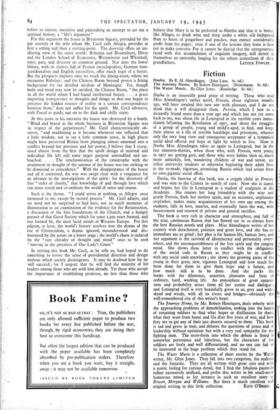Fiction
Dasha. By E. M. Almedingen. (John Lane. 8s. 6d.) The Journey Home. By Robert Henriques. (Heinemann. 8s. 6d.) The Water Music. By Glyn Jones. (Routledge. 8s. 6d.)
Dasha is an Unusually good piece of writing. Those who read Miss Ahnedingen's earlier novel, Frossia, about eighteen months ago, will have awaited this new one with_pleasure, and I dO not think that it will disappoint them. Frossia, which I lent to a dastardly friend more than a year ago and which has not yet come back to me, was about life in Leningrad in the terrible years imme- diately fellowing the Revolution of 1917, and about the struggles of a group of people, young -and middle-aged, to find, and keep, their places in a life of terrible hardships and privations, wherein only the very long view and courageous acceptance of a tyrannical social ideal offered any hope or light by which to live. Now in Dasha Miss Almedingen takes us again to Leningrad, but in the late nineteen-thirties, when those who, with Frossia, were young in 1917 are getting grey, and those who were babies then or, much more unluckily, lost, wandering children of war and terror, are either university students or otherwise beginning their adult lives in the re-made, vigorous, promising Russia which had arisen from its own gigantic social effort.
Dasha, the heroine of this book, was a cripple child in Frossia, and was sent to the Crimea in search of cure. Now she is cured, and begins her life in Leningrad as a student of sculpture at the Academy. She renews her long friendship with the wise and gentle Frossia, finds her mother again, and an eccentric, unpleasant stepfather, makes many acquaintances of her own age among the students, falls in love, marries, and eventually faces the war, with bereavement and renewal of private and general sacrifice.
The book is very rich in character and atmosphere, and full of the true, continuous Russia that has flowed out to us always from the best Russian novels and plays. Miss Almedingen writes of her country with detachment, patience and great love, and she has no immediate axe to grind'; her plea is for human life, human love, and her argument is the survival of idiosyncrasy and personality every- where, and the unconquerableness of the free spirit and the ranging mind. She shows these latter in conflict with the obligations of the social code in Russia as they might be in conflict with any social code anywhere ; she shows the growing pains of the young in their great, new, vigorous Leningrad and how much has 7 been done for them to give them hope and a future, and how much still is to be done. And she packs the s. books with the dilemmas, anxieties, pleasures and frets of ordinary,' hard, working life.- An atmosphere of great natural- ness and probability arises from all her scenes and dialogue ; and Leningrad itself is very beautifully given to us, grey and wide- skyed and windy, with all its rivers and bridges—obviously the well-remembered city of this writer's heart.
The Journey Home, by Mr. Robert Henriques, deals soberly with the approaching problems of demobilisation, seeking into the hearts of returning soldiers to find what hopes or disillusions lie there, what they want from home and life after five years of war, and how they are to get any of their just deserts secured to them. This book is sad and grave in tone, and debates the questions of peace and of leadership without optimism but with a very real sympathy for the fighting men. The story-form into which the debate is fitted is somewhat portentous and laborious, but the characters of the soldiers are lively and well differentiated, and no one can fail to be interested in the huge problem which they stand for.
The Water Music is a collection of short snories by the Welsh writer, Mr. Glyn Jones. They fall into two categories, the realistic and the fantastic. They are all written with great care and with a poetic feeling for curious detail, but I find the fabulous pastorals rather excessively artificed, and prefer this writer in his small-town humorous mlood, as for instance in such an excellent story as Bowen, Morgan and Williams. But there is much excellent and original writing in this little collection. Kam O'BarEN.


























 Previous page
Previous page